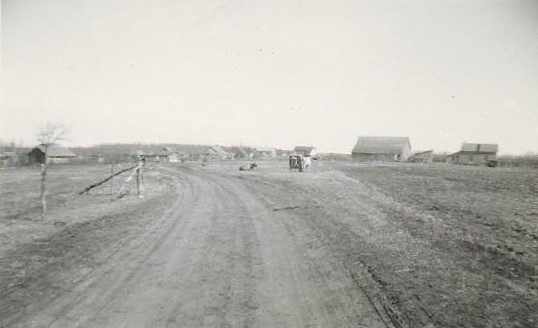COLUMN: Tales from the Gravel Ridge – Footsteps on the ridge
Advertisement
A gravel ridge was the roadway that served as the pathway from my Rosengard home to the wide world beyond. The gravel ridge, a beach ridge left as glacial Lake Agassiz receded, has been a significant feature of my development throughout my life. How could it be otherwise?
Running somewhat diagonally immediately past my home in a relatively straight line from east to west, was the gravel ridge that connected me to the rest of the world. I could not have imagined a better introduction. Looking out of my kitchen window on a late winter afternoon, I could see the trajectory of the setting sun. Quite possibly that is how I developed a sense of the direction designated as “west”. There is no end to the lessons I learned from the perspective of living next to the gravel ridge. Better said, living on the gravel ridge, since our farm, and indeed, our entire neighbourhood extended beyond the apex of the ridge.
The ridge gave me options in various ways. One of these was making the decision to go in a westerly direction, which meant turning to the right from the vantage point of my home. One afternoon in 1947, my sister Anne and I accompanied Margaret Penner, our teacher’s youngest daughter, for a walk down the gravel ridge, perhaps some 400 metres. Although the prairie crocus is Manitoba’s provincial symbol, that occasion, in the company of my sister and her friend, remains fixed in my memory bank for the simple reason that I cannot recall ever seeing the crocus in the wild before that day, nor after.

Turning to the left, and walking in an easterly direction from my home I would, in a matter of minutes, arrive at the Rosengard School, No. 2168. What a well travelled path that would be for members of my family, and indeed for our neighbourhood.
Classes at the Rosengard School became the windows and doors that opened countless opportunities for all who attended over the period of four decades that the school was in existence. We became readers and writers, as well as amateur scientists and historians. The lessons we received and absorbed were elementary to be sure. Nevertheless, the instruction that was given to us in that one-room country school over a period of many years opened doors for us. These doors broadened our view of the world beyond the gravel ridge. Who can possibly evaluate or gauge the immensity of the basic lessons we were taught in that crowded classroom so very many decades ago. Those who attended have, possibly quite unwittingly, passed on those lessons and influences to others, be it to our parents and members of our extended families or indeed, future generations. In the words of Tennyson,
^
I am a part of all that I have met;
Yet all experience is an arch wherethro’
Gleams that untravell’d world whose margin fades
For ever and forever when I move.
^
Walking down that somewhat irregular roadway meant I had a path readily traversable throughout the year, to my friend Mary Penner’s home to the east of the school, or to the home of Annie Nikkel who welcomed children to her parental home for Sunday School classes. The social opportunities provided by that roadway of many, many years ago, continue to inform my view of life, and in fact, of the way I relate to others. It was, after all, the path that provided all of us the opportunity to see the rest of the world from another perspective.
The gravel ridge also gave me a viewpoint from which to absorb the life-affirming landscape of my Rosengard childhood home, one that still fills me with joy and gratitude. To envisage from my present circumstances, the humble farmyard and its woodland where I spent countless memorable hours of my childhood and beyond, confirms for me the words of Gerard Manley Hopkins who wrote, “The world is charged with the grandeur of God.”
The poet goes on to bemoan the havoc man has caused on earth, but then concludes :
^
And for all this, nature is never spent;
There lives the dearest freshness deep down things;
And though the last lights off the black West went
Oh, morning, at the brown brink eastward, springs—
